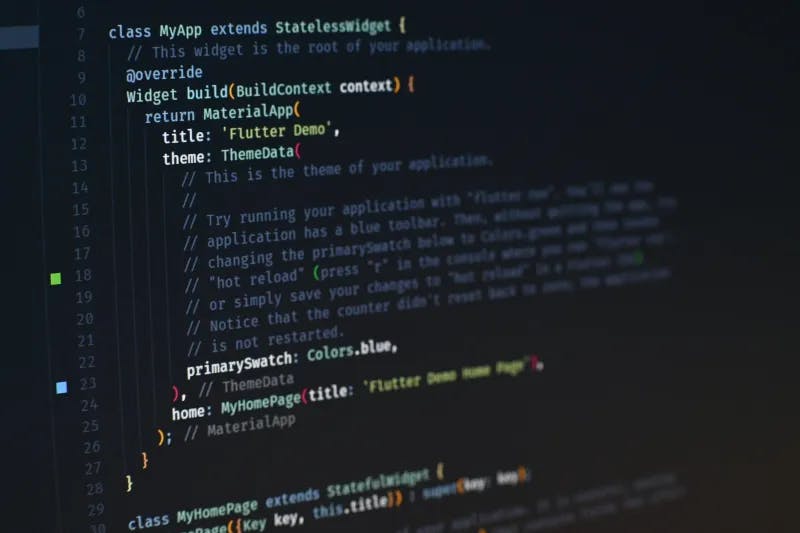Maximize Your Productivity with These Clean Code Techniques

Introduction :
As a software developer, I believe that writing clean and efficient code is crucial for producing high-quality software that runs smoothly and is easy to maintain. However, achieving this goal is not always straightforward as there are numerous factors to consider, including code complexity, readability, formatting, comments, data structures, algorithms, debugging tools, unit tests, and code refactoring.
In this blog, I would like to delve deeper into these factors and provide 10 tips for writing cleaner and more efficient code. These tips will be helpful for improving coding skills and building better software that is easier to maintain and more efficient to run.
So without wasting any time, let's get into this...

Keep Your Code Simple :
Keeping code simple is the first tip I recommend for writing cleaner and more efficient code. I believe that complexity can make it difficult to understand and maintain code in the long run. That's why it's important to use straightforward logic and avoid unnecessary complexity. Breaking down larger tasks into smaller, more manageable ones can also help in achieving this goal. By simplifying your code, you can improve its efficiency and make it easier to maintain over time.

Write Readable Code :
The second tip that I always keep in mind while writing cleaner and more efficient code is to ensure readability. I believe that readable code is easier to understand and maintain over time. To achieve this, I make sure to use descriptive names for variables, functions, and classes and ensure that my code is well-organized and easy to follow.
I also follow established coding conventions and standards to ensure readability. These guidelines offer suggestions for naming conventions, code formatting, and other coding practices, which I find useful in creating consistent and easy-to-read code. By following these guidelines, not only can I make my code easy to understand for myself, but also for other developers who may work on the project in the future.

Use Consistent Formatting :
As a developer, it's important to use consistent formatting in my code to make it more readable and understandable. You can achieve this by using the same formatting style throughout your code, including indentation, spacing, and line breaks.
To ensure consistent formatting, I find it helpful to use an integrated development environment (IDE) or a code editor that supports code formatting. With these tools, I can easily set predefined rules and standards for formatting, and the tool will automatically format my code accordingly. This saves me time and effort while ensuring that my code is always consistently formatted.
Use Comments Wisely :
I understand that comments can be useful for explaining complex code or documenting my work. However, I also know that too many comments can make my code harder to read and understand.
To use comments wisely, I make sure to only use them when necessary and sparingly. I use comments to explain why my code is doing what it does, rather than what the code is doing. This helps to make my code more readable and understandable.
Additionally, I avoid using redundant or unnecessary comments that add no value to my code. This helps to keep my code clean and efficient, without cluttering it up with unnecessary comments.

Avoid Repetitive Code :
I always try to avoid writing repetitive code because it can be time-consuming and difficult to maintain. Instead, I use functions, classes, and libraries to prevent myself from writing the same code multiple times.
To avoid repetitive code, I utilize code reuse techniques. These techniques enable me to write code once and reuse it multiple times. For instance, I can use functions to encapsulate common code and make it reusable across various parts of my application. This approach helps to save time and effort while ensuring that my code is clean, efficient, and maintainable.

Use Data Structures Effectively :
By using the appropriate data structures, I can improve the efficiency of my code.
To achieve this, I make sure to use arrays, lists, and maps to store and manipulate data. Additionally, I choose the appropriate data structure for each task I am working on. This means selecting the data structure that is most efficient for the task at hand.
By using data structures effectively, I can make my code more efficient and easier to maintain, ultimately resulting in a cleaner and more efficient codebase.
Optimize Your Algorithms :
As a developer, I know that optimizing algorithms is crucial to make my code run faster and use less memory. To achieve this, I must choose the right algorithms that are efficient for the task at hand.
Sometimes, a simple algorithm might be the most efficient choice, while other times, a more complex algorithm may be necessary to achieve the desired result. Therefore, I carefully choose the appropriate algorithm that can efficiently solve the problem.
One way I can optimize my algorithms is by avoiding brute force approaches when more efficient solutions are available. For instance, when searching for an item in a list, instead of using a linear search algorithm that checks each item in the list one by one, I can use a binary search algorithm that is much faster for large lists.
Another way to optimize algorithms is by using data structures effectively. For example, using a hash table can be much faster than using a list when looking up items by a key.

Use Debugging Tools :
Debugging is an essential part of software development. Even the most experienced developers make mistakes, and debugging tools can help you find and fix errors in your code quickly and efficiently.
There are many debugging tools available, including debuggers, profilers, and loggers. Debuggers allow you to step through your code line by line and inspect variables and data structures to understand what your code is doing. Profilers help you identify performance bottlenecks in your code by tracking how much time is spent in each function. Loggers allow you to write messages to a log file that you can review later to understand what your code was doing at a specific point in time.

Using debugging tools can save you a lot of time and frustration when you're trying to track down an error in your code. It's a good idea to familiarize yourself with the debugging tools available for your programming language and development environment.
Write Unit Tests :
Unit tests are small pieces of code that test specific functions or features of my software, allowing me to catch errors and bugs before they become significant problems.
To write effective unit tests, I always ensure that I have a good understanding of the requirements for my software and the behavior of each function or feature that I'm testing. Moreover, I make sure to cover all possible edge cases and error conditions to ensure that my code is working correctly.
There are several testing frameworks available for different programming languages, and many modern integrated development environments (IDEs) come with built-in testing support. By writing unit tests for all of my code, I can ensure that it works as expected, and any errors or bugs are detected and fixed early in the development process.
Continuously Refactor Your Code :
Refactoring is the process of improving your code by making it more efficient, more maintainable, and easier to understand. It's a good idea to continuously review your code and look for ways to simplify and optimize it.
When refactoring your code, you might look for opportunities to extract common functionality into functions or classes, remove duplicated code, or simplify complex logic. You might also consider using design patterns or refactoring techniques to improve the structure of your code.
Refactoring can be time-consuming, but it's an important part of keeping your code clean and efficient. By continuously reviewing and improving your code, you can ensure that it remains maintainable and easy to understand over time.
Conclusion :
These 10 tips can greatly improve the quality of your code and make the development process smoother. By writing clear and concise code, avoiding global variables, using meaningful names, utilizing comments effectively, avoiding repetitive code, optimizing algorithms, using data structures efficiently, and writing unit tests, you can create code that is easier to read, maintain, and debug. Remember to always consider your audience and aim for code that is both functional and readable. By implementing these tips, you can become a more effective and efficient developer.

See you in the next blog, Until then keep Developing and Solving.....
Comments (7)
Exactly what i was looking for 👍🏻
GREAT one Pratik Mali
Thanks for sharing Pratik Mali
I appreciate how you emphasized the importance of testing your code.
I found it to be really helpful, thanks for sharing Pratik Mali
Thanks for sharing
pls pratik tell me how to used gif in blog
 Develop and Solve
Develop and Solve 





